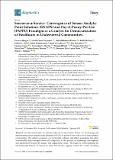Sensor-as-a-service: convergence of Sensor aNAlytic Point Solutions (SNAPS) and Pay-A-Penny-Per-Use (PAPPU) paradigm as a catalyst for democratization of healthcare in underserved communities
Author(s)
Morgan, Victoria; Casso-Hartmann, Lisseth; Bahamon-Pinzon, David; McCourt, Kelli; Hjort, Robert G.; Bahramzadeh, Sahar; Velez-Torres, Irene; McLamore, Eric; Gomes, Carmen; Alocilja, Evangelyn C.; Bhusal, Nirajan; Shrestha, Sunaina; Pote, Nisha; Briceno, Ruben Kenny; Datta, Shoumen Pa; Vanegas, Diana C.; ... Show more Show less
Downloaddiagnostics-10-00022-v2.pdf (2.976Mb)
Publisher with Creative Commons License
Publisher with Creative Commons License
Creative Commons Attribution
Terms of use
Metadata
Show full item recordAbstract
In this manuscript, we discuss relevant socioeconomic factors for developing and implementing Sensor aNAlytic Point Solutions (SNAPS) as point-of-care tools to serve impoverished communities. The distinct economic, environmental, cultural, and ethical paradigms that affect economically disadvantaged users add complexity to the process of technology development and deployment beyond the science and engineering issues. We begin by contextualizing the environmental burden of disease in select low-income regions around the world, including environmental hazards at work, home, and the broader community environment, where SNAPS may be helpful in the prevention and mitigation of human exposure to harmful biological vectors and chemical agents. We offer examples of SNAPS designed for economically disadvantaged users, specifically for supporting decision-making in cases of tuberculosis (TB) infection and mercury exposure. We follow-up by discussing the economic challenges that are involved in the phased implementation of diagnostic tools in low-income markets and describe a micropayment-based systems-as-a-service approach (pay-a-penny-per-use--PAPPU), which may be catalytic for the adoption of low-end, low-margin, low-research, and the development SNAPS. Finally, we provide some insights into the social and ethical considerations for the assimilation of SNAPS to improve health outcomes in marginalized communities. Keywords: sensor analytic point solutions (SNAPS); environmental health; poverty; pay-a-penny-per-use (PAPPU); public health
Date issued
2020-01-01Department
Massachusetts Institute of Technology. Auto-ID LaboratoryJournal
Diagnostics
Publisher
Multidisciplinary Digital Publishing Institute
Citation
Morgan, Victoria, et al., "Sensor-as-a-service: convergence of Sensor aNAlytic Point Solutions (SNAPS) and Pay-A-Penny-Per-Use (PAPPU) paradigm as a catalyst for democratization of healthcare in underserved communities." Diagnostics 10, 1 (2020): no. 22 doi 10.3390/diagnostics10010022 ©2020 Author(s)
Version: Final published version
ISSN
2075-4418